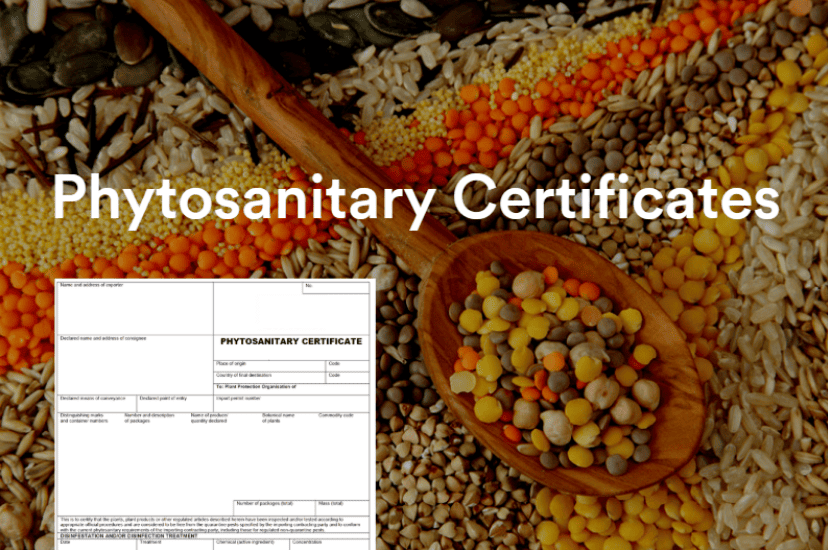- October 3, 2024
- Posted by: admin
- Categories: Export Financing, Blog

When exporting plants and plant products from India, one important document you need is the Phytosanitary Certificate. This certificate plays a crucial role in ensuring that the products you are exporting are safe and free from harmful pests and diseases. Let’s dive into what a Phytosanitary Certificate is, why it’s important, and how to obtain one in very simple terms.
What is a Phytosanitary Certificate?
A Phytosanitary Certificate is a document that confirms that plants or plant products being exported have been inspected and are free from pests and diseases. This certificate is issued by the National Plant Protection Organization (NPPO) of the exporting country, like India, and is sent to the NPPO of the importing country, such as the United States or any other country. The certificate ensures that the plants or plant products meet the health standards required by the importing country to protect their agriculture from potential threats.
Why is a Phytosanitary Certificate Important?
The Phytosanitary Certificate is vital because it helps prevent the spread of pests and diseases across borders. When plants or plant products are exported without proper inspection, they can carry pests or diseases that could harm the agriculture of the importing country. This could lead to economic losses, environmental damage, and strict trade restrictions. Therefore, having this certificate reduces the risk of your shipment being rejected or placed under quarantine, which can be costly and time-consuming.
Products Covered Under a Phytosanitary Certificate
The Phytosanitary Certificate is generally required for exporting a variety of plant products. These can include seeds, fruits, vegetables, flowers, and other plant materials. The specific requirements may vary depending on the importing country’s regulations, but the certificate is a common requirement for most plant-related exports.
Types of Phytosanitary Certificates
There are two main types of Phytosanitary Certificates:
Phytosanitary Certificate for Export: This is the standard certificate issued when plants or plant products are being exported from one country to another. It confirms that the products have been inspected and found to be free from pests and diseases.
Phytosanitary Certificate for Re-Export: This certificate is issued when plants or plant products that were imported into a country are being re-exported to another country. It ensures that the products are still free from pests and diseases and have not undergone any treatments not recognized by the importing country.
What Information is Included in a Phytosanitary Certificate?
A Phytosanitary Certificate contains several important pieces of information:
Exporter and Importer Information: This includes the names and addresses of the exporter (the person or company sending the goods) and the importer (the person or company receiving the goods).
Consignment Information: Details about the plants or plant products being exported, such as their type, quantity, and packaging.
Phytosanitary Treatment Information: If the plants or plant products have been treated to eliminate pests or diseases, the certificate will include details about the treatment method and the date it was carried out.
Inspection Information: Confirmation that the products have been inspected and are free from pests and diseases. This section also includes the date and location of the inspection, along with the name and signature of the inspector.
Declarations: Statements confirming the accuracy of the information provided and compliance with the phytosanitary requirements of the importing country.
Documents Required to Obtain a Phytosanitary Certificate
To get a Phytosanitary Certificate, you will need to prepare and submit several documents:
Commercial Invoice: This document provides details about the transaction between the exporter and the importer, including the product description, quantity, price, and terms of sale.
Packing List: A document that lists the contents of each package in the shipment, including their weight and dimensions.
Certificate of Origin: This document confirms the country where the goods were produced or manufactured.
Export License: For certain products or destinations, you may need an export license.
Phytosanitary Certificate Application: A form provided by the NPPO of the exporting country that includes information about the plants or plant products being exported.
How to Obtain a Phytosanitary Certificate
Here is a step-by-step guide to obtaining a Phytosanitary Certificate:
Contact the NPPO: Reach out to the National Plant Protection Organization of India for specific guidance on the requirements for your products.
Prepare Necessary Documents: Gather all required documents, including the Phytosanitary Certificate application, commercial invoice, packing list, certificate of origin, and export license (if needed).
Arrange for Inspection: Ensure the plants or plant products are inspected and, if necessary, treated for pests or diseases.
Submit Your Application: Submit the Phytosanitary Certificate application along with the required documents to the NPPO for review.
Receive the Certificate: If everything is in order, the NPPO will issue the Phytosanitary Certificate.
Provide the Certificate to Importer: The exporter must then give the Phytosanitary Certificate to the importer or shipping company to present it to the authorities of the importing country.
Conclusion
The Phytosanitary Certificate is a key document for anyone looking to export plants or plant products from India. By ensuring your products are free from pests and diseases, this certificate helps protect the agriculture of importing countries and facilitates smooth international trade. Make sure you have all the necessary documents and follow the proper steps to obtain your Phytosanitary Certificate to avoid any issues with your export shipments.